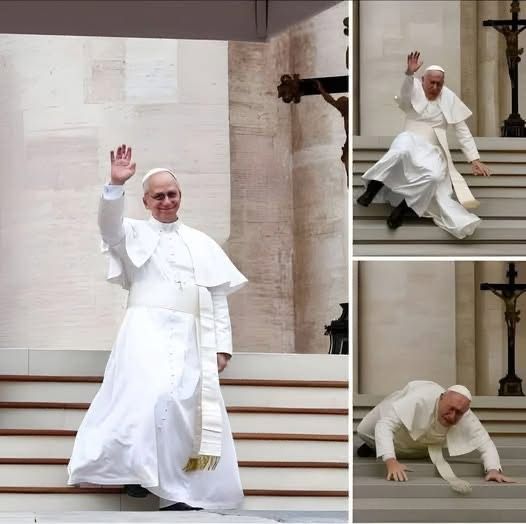When Pope Leo XIV stepped onto the balcony overlooking St. Peter’s Square for the first time, the world felt a subtle shift. It wasn’t the thunderous applause, the sea of waving flags, or the anticipation that made the moment memorable—those were expected. Instead, what stood out was the unusual calmness of the man chosen to lead the Catholic Church into its next chapter. There was something deliberate, steady, and quietly confident in the way he greeted the crowd. Even before he spoke a word, it became clear that his papacy would carry its own distinctive tone.
The inauguration Mass that followed reflected centuries of tradition, yet the atmosphere had a freshness people couldn’t quite put into words. The square was overflowing—pilgrims from across continents, clergy from every order, diplomats from dozens of countries, families, students, and people who simply wanted to witness history. Many attendees later said the silence before the ceremony began felt like “a collective breath waiting to be released.” Millions more watched from homes, offices, and public plazas around the globe.
A Ceremony Rooted in History Yet Marked by Humility
As the rituals commenced, the symbolism was powerful. The Palio—signifying the Pope’s role as shepherd—was draped across Leonardo Rojas’ shoulders, now formally known as Leo XIV. Then came the Fisherman’s Ring, arguably the most iconic symbol of papal authority. These acts were deeply familiar to the faithful, but what made them resonate differently was the Pope’s demeanor. He didn’t carry the air of a monarch assuming a throne. Instead, he appeared as a man entering into service.
Observers across cultural and political backgrounds noticed the same thing: his acceptance of the symbols of leadership was accompanied by a level of humility rarely seen on global stages. Pope Francis had emphasized modesty during his pontificate, and many wondered whether Leo XIV would follow that path or shift the Church’s direction. His brief inaugural address offered only a glimpse, focusing on unity, compassion, and the shared responsibility of healing a fractured world.
But it was enough. The message was concise but purposeful, suggesting a continuation of the Church’s recent emphasis on simplicity, outreach, and closeness to everyday people.
A Pontiff Shaped by Two Continents
What captivated international audiences in the days that followed was more than his ceremonial responsibilities. Pope Leo XIV represented a blend of cultures, histories, and personal experiences that gave him a unique moral and emotional perspective.
Born in Chicago to a modest working-class family, he understood the struggles of ordinary citizens. But the story many people didn’t know until after his election was his strong emotional and spiritual connection to Latin America, particularly Peru.
For him, Peru wasn’t merely a location where he once served; it was a place that transformed his worldview. His fluency in Spanish wasn’t surprising, but the warmth with which he spoke about his years in Chiclayo touched many, drawing instant affection from Catholics and non-Catholics alike.
During his inaugural week, he addressed Latin American communities directly in Spanish. His tone shifted—not to impress, but to express gratitude. He spoke of the people, the culture, the food, the traditions, and the lessons he learned there. It wasn’t political messaging. It was personal history.
A Life Rooted in Service Before Leadership
His journey to Peru began in 1985 on what was meant to be a short mission trip. But the experience reshaped his trajectory entirely. Instead of returning home as planned, he extended his stay—first for months, then years—living among working families, assisting local churches, teaching in remote areas, and collaborating on small community-building projects.
People who knew him during that period recall his hands-on approach. He repaired classrooms, delivered food, helped organize youth groups, and spent long evenings listening to villagers’ challenges and hopes.
In many ways, these experiences molded him more profoundly than any academic degree or Vatican-based assignment ever could.
Some programs he helped initiate still operate today, including literacy workshops, youth mentorship networks, and small agricultural cooperatives. Residents who worked with him say he was never interested in credit—often choosing to remain in the background.
A Mysterious Prediction
More than two decades ago, before he even imagined ascending to the highest office of the Catholic Church, someone close to him told him something he would never forget: that one day he would be called to Rome to take on a much larger mission.
He brushed it off at the time, assuming it was symbolic or aspirational. But as he admitted in a recent interview, the memory lingered.
He never described it as a prophecy, nor did he present it as destiny. Instead, he spoke of it with humility—as a curious moment that made more sense only in hindsight.
A Close Call During a Major Event
Not long after his election, the world witnessed an unexpected moment that could have changed everything.
During a major public event, a heavy piece of stage equipment malfunctioned and crashed dangerously close to the Pope. It wasn’t sabotage nor an act of violence. The Vatican quickly confirmed it as an accident involving lighting infrastructure.
Still, the scene was startling. The object fell only feet away from him. Security moved instantly. Onlookers gasped. News outlets captured the moment, and it quickly spread worldwide.
Incidents involving the safety of global leaders always trigger concern, and this one was no exception. Analysts questioned the maintenance of equipment, reviewed the logistics of large-scale events, and speculated about changes to security protocols.
But what most people remembered wasn’t the accident itself—it was how Pope Leo XIV responded.
He neither exaggerated the threat nor minimized the seriousness. His short statement afterward demonstrated his steady temperament:
Leadership, he said, involves risk. Fear cannot dictate purpose.
He refused to let the event overshadow the message and mission of the gathering. Instead of dwelling on danger, he encouraged people to focus on compassion, hope, and unity.
A Pope Formed by Compassion, Not Only Doctrine
Since assuming the papacy, Leo XIV has been closely analyzed by political leaders, theologians, academics, and journalists. Many wonder how his background—marked not by Vatican bureaucracy but by grassroots service—will shape his decisions.
This combination of scholarly knowledge and real-world experience is rare. And it’s one of the reasons global curiosity continues to grow.
Will he continue reforms?
Many expect he will deepen the Church’s efforts toward transparency, accountability, and community-based ministry.
Will he address global divisions?
His multicultural background positions him uniquely to bridge tensions between regions, ideologies, and generations.
Will he connect with younger Catholics?
His experiences in Latin America and urban U.S. communities give him insight into the aspirations and frustrations of younger faithful.
Will he advocate for social justice?
Given his history of direct service, many believe issues like poverty, inequality, migration, and environmental stewardship will feature prominently in his leadership.
A Pontificate Born at a Time of Global Conflict and Social Change
The world he is stepping into as leader of the Catholic Church is one filled with turbulence—political polarization, cultural conflicts, economic instability, war, climate anxieties, and shifting moral landscapes.
Some see him as a stabilizing figure at a moment when people crave grounded leadership. Others are hopeful he will be a bridge-builder. And some are simply watching to see whether he brings something new or follows established paths.
But one thing is clear: his story resonates because it reflects both tradition and change.
He embodies continuity with the Church’s past, reverence for its rituals, and respect for its structure. Yet he also brings fresh perspectives shaped not by elite circles but by ordinary lives in cities, small towns, and underserved communities.
The Weight of the Vatican and the Heart of Latin America
Leo XIV carries with him three powerful influences:
America in his birth, shaping his early worldview
Latin America in his soul, giving him empathy and cultural depth
The Vatican in his mission, placing the spiritual weight of millions on his shoulders
This combination makes him distinct among modern Popes.
A Leader Who Does Not Rush to Speak
Those who have observed him closely note a pattern: he listens before he speaks. He meets people’s eyes. He considers questions carefully. When he answers, his words are concise but thoughtfully chosen.
His leadership style seems neither theatrical nor detached. Instead, it reflects an approach grounded in presence—being fully attentive to the moment and the people around him.
The World Watches the First Steps of His Papacy
Every new Pope enters the role with expectations—some hopeful, some skeptical, some deeply emotional. But few arrive with the level of global intrigue surrounding Leo XIV.
People want to know:
How will he navigate modern challenges?
Will he be a unifying figure?
What reforms, if any, will define his leadership?
How will his multicultural experiences influence Church decisions?
Will his papacy leave a legacy of transformation?
Only time will answer these questions, but early signs point to a leader who values service over spectacle, depth over noise, and authenticity over political maneuvering.
A Beginning That Feels Like a Turning Point
Even at this early stage, it’s clear that Pope Leo XIV brings more than new energy to the papacy. He brings a narrative shaped by faith, resilience, cultural bridges, and a lifelong commitment to the people often overlooked.
He is a Pope at ease among world leaders, yet equally at home in the humble chapels of rural villages.
A scholar formed by academia, yet grounded in the lives of farmers, teachers, and families.
A spiritual leader shaped by both North and South America, standing now at the center of global Catholicism.
His papacy began with grandeur—a global ceremony, ancient rituals, and a breathtaking crowd. Yet it is his quiet steadiness, his careful speech, his heartfelt connection to Peru, and his calm reaction to a frightening incident that have left the deepest impression.
The world waits to see what comes next. But one thing is certain: Pope Leo XIV’s story is only beginning—one of purpose, complexity, and a leadership style that promises to be anything but silent.

